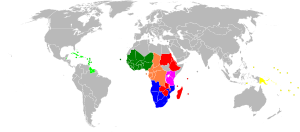Organisation of African, Caribbean and Pacific States Organisation des États d'Afrique, des Caraïbes et du Pacifique | |
|---|---|
|
Flag | |
 | |
| Secretariat | Brussels, |
| Official languages | |
| Government | |
| Georges Chikoti | |
| Establishment | 6 June 1975 |
Website www | |

The Organisation of African, Caribbean and Pacific States (OACPS, French: Organisation des États d'Afrique, des Caraïbes et du Pacifique) is a group of countries in Africa, the Caribbean, and the Pacific that was created by the Georgetown Agreement in 1975. Formerly known as African, Caribbean and Pacific Group of States (ACP), the organisation's main objectives are sustainable development and poverty reduction within its member states, as well as their greater integration into the world's economy. All of the member states, except Cuba, are signatories to the Cotonou Agreement with the European Union.
The Cotonou Agreement (signed in Cotonou, Benin, in June 2000) is the successor to the Lomé Conventions. One of the major differences from the Lomé Convention is that the partnership is extended to new actors such as civil society, private sector, trade unions and local authorities. These will be involved in consultations and planning of national development strategies, provided with access to financial resources and involved in the implementation of programmes.
Many small island developing states are OACPS states; the fourth Lomé Convention was revised in 1995 in Mauritius and gives special attention to island countries in this agreement. Combined the EU and the members of the OACPS represent over 1.5 billion people and more than half of the seats at the United Nations.[1]
- ^ "Gomes welcomes new agreement". The Daily Nation. 17 April 2021. Retrieved 8 June 2021.
Together, the EU and the members of the OACPS represent over 1.5 billion people and more than half of the nations at the United Nations. Gomes, who stepped down as secretary general of the 79-member grouping in February this year, told the Caribbean Media Corporation (CMC) that the initialed text will now go to all the member states and can be treated as a public document to await a signing ceremony, possibly before the end of this year as the life of the Cotonou Agreement has been extended to December 31, 2021.
